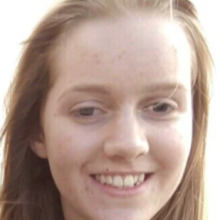
Aniston Inger-Holland has never had any formal tuition in Russian - but has come ninth in the world in a Dunedin-based online language competition.
She started teaching herself the language in her first year of high school in 2014, and has persevered despite major operations on her eyes and hips.
"I just came across the Russian language and I really enjoyed learning it," she said.
"I looked at YouTube videos and online apps and stuff."
Aniston, who turns 17 next month, is a Year 12 student at Ormiston Senior College in South Auckland, studying English, biology, economics, statistics and Spanish.
But the school has no language teachers, so she does the Spanish in class time through the Correspondence School.
She started Spanish in her primary school which had a Spanish teacher, and she also learned Japanese at Mission Heights Junior College, but she now studies both Japanese and Russian in her own time.
She took part in all three languages in this year's Language Perfect world championships, in which students have to translate words and phrases online in 10 days, answering as many questions as they can for a maximum of eight hours a day.
Aniston answered 28,806 questions and got 10,011 questions correct, placing her 968th out of about 50,000 students in 27 countries.
The overall winner, Atharv Naik from the Cambridge International School in Dubai, answered 58,300 questions correctly. The top NZ student was Year 9 Paraparaumu College student Cullen Tran, with 41,878 correct answers.
But Aniston's remarkable achievement was getting 3082 correct answers in her self-taught language Russian, placing her ninth out of almost 2000 students in the world. Six of the eight students ahead of her were in Uzbekistan, close to Russia.
Aniston caught an infection in her hip as a baby which left her with one leg shorter than the other, and had a major operation last year to bring her legs back into balance.
She has also needed eye operations for juvenile glaucoma, and has had to miss school many times for medical appointments.
"I actually kind of enjoyed studying in that time off," she said.
"Last year I missed quite a bit of my chemistry classes, so I did get really behind. But in the holidays before my exams I did a lot of study and managed to get my chemistry with a Merit.
"When I study I usually stay up till 3 or 5 in the morning, and I actually do manage to get through the next day."
She applied those study habits to the language championship, using almost every waking hour when she was not in other classes for the 10-day competition.
"We had study periods, I would do it during those, and after school until the early hours of the morning," she said.
"I actually quite enjoyed it. Coming in the top 10 in Russian against Russian people, that was just really quite an accomplishment. It was worth it!"
The championships are run by Dunedin-based Education Perfect, a company started by chief executive Craig Smith when he was still a student at St Kentigern College in Auckland.
The 28-year-old said the company now had about 450,000 subscribers across multiple subjects paying $40 each.
He employs more than 80 fulltime staff, mainly in Australia and New Zealand.
"In Australia and New Zealand we have 40 to 50% of all secondary school language students registered for events," he said.
"It just started as quite a small NZ event and teachers spoke to each other and tweeted and Facebooked, and it's grown over the years to be one of the largest language competitions in the world."
Dr Martin East, the immediate past-president of the NZ Association of Language Teachers, said students were motivated by the competitive element.
"We would encourage it as one of several tools that could be used to enhance language learning for students."












